Using Hearing Aids on Windy Days

Fall is transitioning into winter, which means changing temperatures and air pressures, which means wind. Windy weather can be a nuisance, but it poses an extra challenge for hearing aid users: wind noise. What Causes Wind Noise? Wind noise happens with any microphone in conditions with fast-moving air. Wind, cycling or driving with the window…
What to Expect at Your Hearing Aid Fitting Appointment

Now that you’ve had your hearing evaluated and selected your hearing aid style, it’s time for your hearing aid fitting appointment. This is an integral part of the process, and you’ll walk out of your appointment with your brand-new hearing aids. It’s going to be a rather long appointment; a hearing aid fitting is a…
How To Use a Hearing Aid App

There’s an app for anything, and that includes your hearing aids! These smartphone applications are available to hearing aid users, and it’s like turning your phone into a remote control for your hearing aids. Having control over your hearing aids gives you more independence and flexibility and allows you to customize your hearing according to…
Are My Sunglasses Interfering With My Hearing Aids

If you use hearing aids and also like to sport sunglasses, you might be wondering whether these two accessories can coexist comfortably. It’s a common concern, after all, about 28.8 million Americans could benefit from hearing aids, yet many hesitate to wear them consistently. One worry some people have? That glasses might interfere with their…
What to Know About Protecting Your Residual Hearing

If you’ve been diagnosed with hearing loss, preserving the hearing you still have, also known as residual hearing, is a critical part of long-term hearing health. Hearing loss typically can’t be reversed, so once diagnosed it’s important to take taking the right steps to help slow its progression. Why Protecting Residual Hearing Matters Residual hearing…
Why Hearing Checks Should Be a Regular Part of Your Healthcare Routine

Maintaining strong hearing is key for staying connected with your surroundings and loved ones. Consider how you prioritize your hearing health and what you can do to implement hearing health maintenance as part of your healthcare routine. Why You Should Prioritize Hearing Tests Hearing loss can develop slowly, making it easy to miss early warning…
What Can I Expect with Bluetooth® Hearing Aids?

If you’re considering hearing aids, you may wonder what features you should consider. Bluetooth technology allows your hearing devices to connect directly to your phone, computer or other technology. Our team at can tell you more about Bluetooth features to help you find the perfect pair of hearing aids. Easily Stream from Your Other Devices…
If You’re Over 50, Here’s What You Should Know About Sensorineural Hearing Loss

Are you over 50 and finding it harder to keep up with conversations? Do you struggle to hear clearly in noisy environments? Have loved ones or colleagues pointed out changes in your hearing? If any of this sounds familiar, you may be experiencing sensorineural hearing loss. Understanding Sensorineural Hearing Loss Sensorineural hearing loss happens when…
Thanksgiving Together: How Hearing Aids Help Create a Day of Connection

Thanksgiving is a time to gather with those we cherish, give thanks and eat lots and lots of food. But for those with hearing loss, the lively buzz of a holiday meal can sometimes feel like a challenge instead of a celebration. If you or a loved one struggles with hearing loss, this Thanksgiving could…
What To Know About Auditory Training

Hearing loss impacts more than one in 10 people in the United States. Hearing loss doesn’t just muffle sounds. It can also make it harder for your brain to recognize familiar noises. Without treatment, the brain starts to forget how to process certain sounds, making it challenging to adjust even after getting hearing aids. That’s…
What to Know About Hidden Hearing Loss
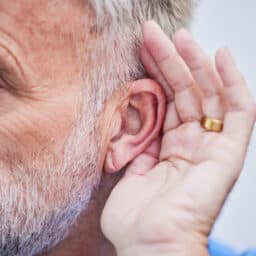
Hidden hearing loss is a type of hearing loss that cannot be discovered on standard hearing tests, but is reported by patients, especially in places with background noise. Hearing loss affects approximately 18% of the population worldwide, and hidden hearing loss could make that percentage even higher. It may be difficult to diagnose, so here’s…
Understanding Hearing Aids and Seasonal Changes
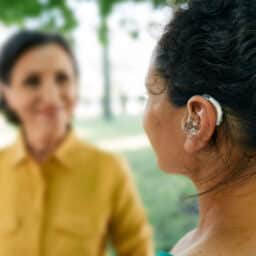
As summer rushes by, it won’t be long before the crisp fall air starts to settle in. The changing seasons not only bring shifts in weather but also in how you should care for your hearing aids. With more than 10% of people in the United States living with hearing loss, and a large portion…
Tips for Driving Safely With Hearing Loss

Approximately 22% of adults ages 65-74 and 55% of those over 75 have disabling hearing loss. When you’re diagnosed with hearing loss, it’s natural to worry about how it will affect your daily life. One common concern is how the condition will affect the safety of your driving. How Does Hearing Loss Affect Driving? Your…
How To Prepare for Hospital Stays with Hearing Loss

A hospital stay can be an uncertain experience for anyone, but for individuals with hearing loss, it can present additional challenges. Effective communication is critical in a healthcare setting, and taking steps to prepare can help ensure you receive the best care possible. Here’s a guide on how to prepare for a hospital stay when…
How To Safeguard Your Hearing Aids While Embracing an Active Lifestyle

Exercise can put you in a better mood, improve your joint and bone health and help stave off conditions like cardiovascular disease and type 2 diabetes. While the right amount of exercise may vary from person to person, the CDC recommends 150 minutes of moderate-intensity physical activity and two days of muscle-strengthening activity per week…
What to Know About Invisible Hearing Aids
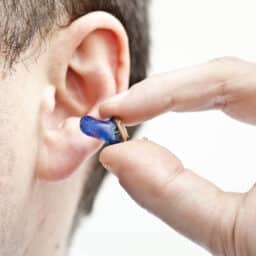
For those considering hearing aids who don’t want them to be noticeable, there may be a solution. An estimated 28.8 million Americans could potentially benefit from the use of such devices. These invisible hearing aids are crafted to be unobtrusive, making them a seamless addition to one’s daily wear. However, it’s essential to weigh the…
Why Does My Earwax Build Up (And Can It Affect My Hearing?)

Cerumen, more commonly known as earwax, is a protective oily substance in the ear produced by glands in the ear canal. Earwax exists to protect the ear against dirt, debris and infection and should naturally expel itself. Sometimes circumstances may prevent this natural process from working as efficiently as it should, leading to a buildup….
What Is Congenital Hearing Loss?

Congenital hearing loss is hearing loss, full or partial, that is present at birth. It is one of the most prevalent chronic conditions diagnosed in children. There is no cure for congenital hearing loss, but there are management options that may prevent further hearing loss and prevent speech-language developmental delays. Symptoms and Causes Most developed…
How To Stay Active with Hearing Aids

Caring for your hearing aids involves gentle handling and regular drying, which might make it seem odd to wear them during exercise. However, with proper maintenance, hearing aids can enhance your workout experience and improve your safety. Exercising with Hearing Aids There are several reasons you should consider wearing your hearing aids during exercise. Depending…
Can Vitamin D Deficiency Contribute to Hearing Loss?

More than 1.5 billion people (nearly 20% of the global population) live with hearing loss. Common factors that can increase your risk of hearing loss include aging, loud noise exposure, viral illnesses, genetics and more. New research indicates that vitamin D deficiency could be another risk factor for developing hearing loss. What Is Vitamin D?…
How To Use Headphones While Wearing Hearing Aids

According to the National Institute on Deafness and Other Communication Disorders, “About 28.8 million U.S. adults could benefit from using hearing aids.” Hearing aid technology has advanced at a rapid pace in recent years. One of the latest features is the ability for your hearing aids to act like wireless earbuds using Bluetooth® technology. However,…
How To Choose a Cell Phone When You Have Hearing Aids
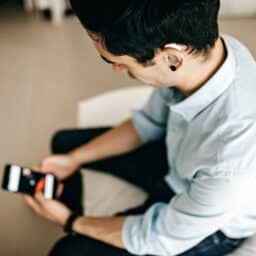
Hearing aids have evolved over the years to not only improve your listening experience but connect with other technology as well, including cell phones. If you’re in the market for a new phone and want to make sure they work well with your hearing aids, let’s examine what you should look for before you head…
Tips for Planning a Cruise with Hearing Aids
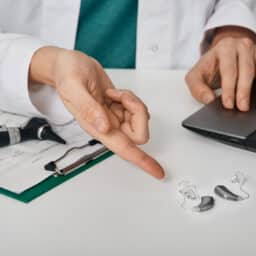
According to the Centers for Disease Control and Prevention (CDC), “In 2019, 7.1% of adults aged 45 and over used a hearing aid; use was higher among men than women in all age groups.” If you’re among this population who wears hearing aids and you’re planning a cruise with your family or friends, below we…
Myth vs. Reality: Hearing Loss, OTC Hearing Aids & You
On Oct. 19, 2021, the U.S. Food and Drug Administration (FDA) issued a landmark proposal intended to improve access to and reduce the cost of hearing aid technology for millions of Americans. The agency proposed a rule to establish a new category of over-the-counter (OTC) hearing aids. When finalized, the rule will allow hearing aids…
What Happens at a Follow-Up Audiology Appointment?
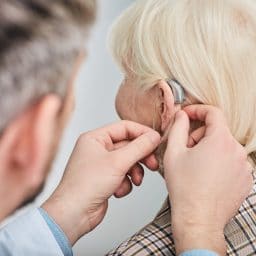
Follow-up appointments are just as important as your initial hearing aid fitting. Let’s look at what to expect as well as things you can do to get the most out of your appointment. Why Do I Need a Follow-Up Hearing Aid Appointment? The National Institutes of Health recommend a follow-up appointment 6 to 12 weeks…
How Are Animals Helping Scientists Improve Hearing Aids?

Researchers are constantly looking for ways to improve hearing technology. One surprising avenue that may offer insight is to study the way insects locate sounds. Hearing Aid Difficulties and Background Noise Hearing aids make it easier for you to process speech and sound in any environment. However, users can still struggle to understand speech in…
How Hearing Loss Can Isolate You & Make You Feel Lonely

After more than two years of staying home due to the global pandemic, most understand the toll loneliness and isolation can have on their mental health. For those with hearing loss, the impact may be even greater. Impact of Loneliness & Social Isolation According to a 2021 study, about 36% of Americans reported experiencing serious…
What to Know About Hearing Aid Repairs and How to Avoid Them
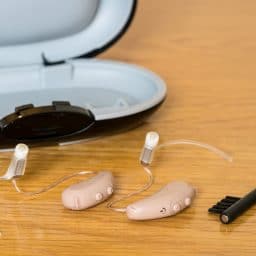
Hearing aids are an investment in your continuing quality of life. They keep you connected to those around you and give you confidence in your hearing ability as you move throughout your day. Because hearing aids play such a big role in your day-to-day life, you want to make sure they stay performing at their…
How to Maintain Hearing Health with Diabetes
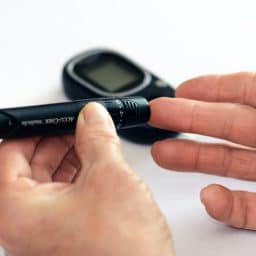
Diabetes is a serious condition that affects the body’s ability to regulate blood sugar. Untreated or poorly managed diabetes can lead to many other health complications, including heart problems, kidney failure, nerve damage, vision problems and stroke. Thankfully, there are many treatments and lifestyle changes that people can make to help manage their diabetes and…
How Hearing Aids Can Help You Better Understand Sound

Though they are similar, hearing a sound and understanding it are not the same thing. Imagine you are out to dinner at a busy restaurant. Maybe you have friends visiting from out of town and decide to take them to Jack Fry’s. It’s packed inside and there is live jazz music playing in the background….
Why Have Your Hearing Aids Stopped Working?
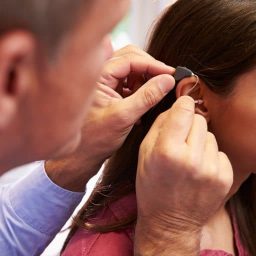
Hearing aids are complex electronic devices. While they are built to provide years of amplification, they will not last forever. Below is a list of the top three reasons why your hearing aids may not be working. Your Hearing Aids Are Not Well Taken Care Of Hearing aids spend all day in your ears –…
Take Advantage of Expiring Charitable Giving Tax Benefits This Year

In March, the CARES Act was passed, helping millions of people across the country during this troubling time. This bill includes several changes regarding charitable giving. There are some important CARES Act provisions that are scheduled to expire on December 31, 2020. These provisions may affect you – and even make it easier for you…
What Are Bone-Anchored Hearing Aids?

While many people with hearing loss are successfully treated with traditional hearing aids, for some, hearing aids aren’t enough. One alternative for such patients is a bone-anchored hearing aid (BAHA). Below is a guide that explains what a BAHA is, how it works and who is an ideal candidate. What Is a Bone-Anchored Hearing Aid?…
Can Babies Wear Hearing Aids?

The first years of your child’s life are the most important in terms of speech and language development. If you child has hearing loss, it’s imperative that they are treated right away. Research shows that treating hearing loss before an infant is six month of age yields the best outcomes, which is why newborn hearing…
Barriers to Pediatric Hearing Aids

How common is hearing loss in children? Hearing loss is common in Kentucky, and it isn’t just confined to older adults; 1-3 out of every 1,000 Louisville babies are born with hearing loss, and almost 15 percent of children aged 6 to 19 have a low- or high-frequency hearing loss of at least 16 decibels…
Free Hearing Screenings

Have you had your hearing checked lately? Heuser Hearing Institute offers free hearing screenings at our five area locations. Questions? Call us at (502) 584-3573. How do you know if you need a hearing screening? The symptoms of hearing loss appear gradually, as it is a progressive condition. Because of this, many do not realize…
Plan the Perfect Valentine’s Day

You know what happens this month – Valentine’s Day! Don’t let your hearing loss prevent you from celebrating this holiday with your loved ones. Who said hearing loss should prevent you from planning a romantic evening? Going Out with Hearing Loss Having hearing loss does not have to prevent you from going out for a nice dinner. Below are…
Hearing Loss FAQ’s
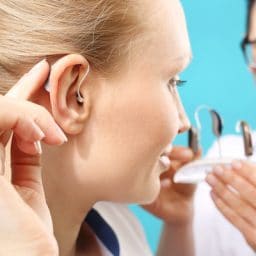
Have you recently been diagnosed with hearing loss in Louisville? If so, you’re likely to benefit from hearing aids. New users are bound to have lots of questions about these devices. Don’t worry – we’ve got answers! The following FAQs are ones your Louisville audiologist encounters most often. WHAT IS A HEARING AID? A hearing…
Adult vs. Pediatric Hearing Aids

Many people associate hearing loss with older individuals, but in reality, it affects people of all ages – even children. About 2-3 out of ever 1,000 children in Louisville are born with hearing loss, and roughly 15 percent of children in Kentucky experience hearing impairment to some degree. Fortunately, the majority can be treated with…
When Hearing Aids Need Assistance

Hearing aids help millions of individuals with hearing loss in Louisville and around the country hear better and communicate more effectively. But there are certain situations in which amplification has its limits. In these instances, hearing impaired patients may benefit from the use of assistive listening devices. Less Than Ideal Environments for Hearing Aids Hearing…
Can Hearing Aids Help Your Career?

Hearing loss is really common; more than 48 million people in Louisville and around the country are currently suffering from it. Even though it affects nearly 20 percent of the population, it is often still stigmatized. Because of that, it should come as no surprise that only about 20 percent of those with hearing loss…
Are There Hearing Aids Just For Kids?

It seems like almost everything has a kid’s version counterpart. Toothpaste? Check. Shampoo? Check. Bikes? Check. Hearing aids? Check! While untreated hearing loss is problematic for adults, it can be harmful to a child’s development. Their understanding of language and social skills as well as learning and behavioral abilities are dependent on their ability to…
Implantable Hearing Devices
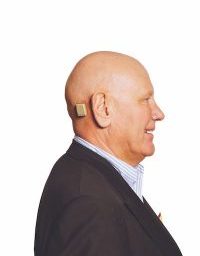
Hearing aids come in an array of shapes and styles, each one serving a specific purpose. They can be programmed to manipulate sound in different ways to suit the specific needs of each hearing aid wearer. So what happens when your type and degree of hearing loss cannot benefit from traditional hearing aids? That’s when…
When should you upgrade your hearing aid?
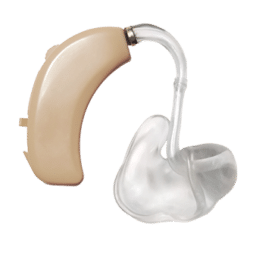
If you’re like me, you hate to get rid of something when it still technically works. This can be true for socks that have holes, plates that have chips and even headphones that don’t always connect. But some things, like life-saving medications or a device helps you connect with the world (cough, hearing aid, cough),…
Signs Everyone with Hearing Loss Should Recognize
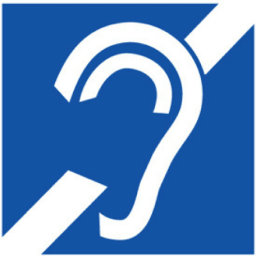
In order to get your driver’s license in Louisville, KY you must pass a written test. Part of that test quizzes you on road signs. Just as knowing what road signs mean is important to driving well, Being able to recognize these important hearing loss signs to be able to successfully navigate the world. Hearing…
ONLINE HEARING AIDS: WHAT’S THE SCOOP?

Like all other medical care, quality hearing care is expensive. While we at Heuser Hearing Institute understand the challenges related to the cost of hearing health care, we believe that building a relationship with a local provider who knows your needs will lead to the best outcomes in hearing care. We also understand that there…
Hearing Aid Brands

Have you ever gotten overwhelmed with the sheer number of brands the store has of toothpaste, yogurt or even tortilla chips? The good thing is that if your choice does not make your teeth sparkle, has a weird good flavor or doesn’t have as much salt as you like, they are all cheap enough to…
Hearing Aid Maintenance

Hearing Aids Need Daily Maintenance What do Phonak, ReSound and Oticon hearing aids all have in common? Besides for being the leading hearing aid manufactures in the industry, all of their hearing aids need daily maintenance to keep them in tip-top shape. Would you buy a luxury car and never change the oil? What about…
Signs Your child May Have Hearing Problems

Hearing loss isn’t confined to older adults: children of all ages can experience a loss of hearing. Roughly 3 out of 1000 babies are born with hearing loss, and its prevalence is increasing in adolescents. Noise-induced hearing loss is largely responsible for this increase. If you suspect your child is having difficulty hearing, talk to…
Hearing Aid Misconception
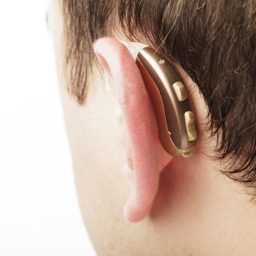
Do you suffer from hearing loss but are not currently seeking treatment? If so, you are part of the 80 percent of the 48 million individuals in Louisville and around the country who could find benefits from a hearing aid but choose not to do so. While your reasons may range from denial or simply…